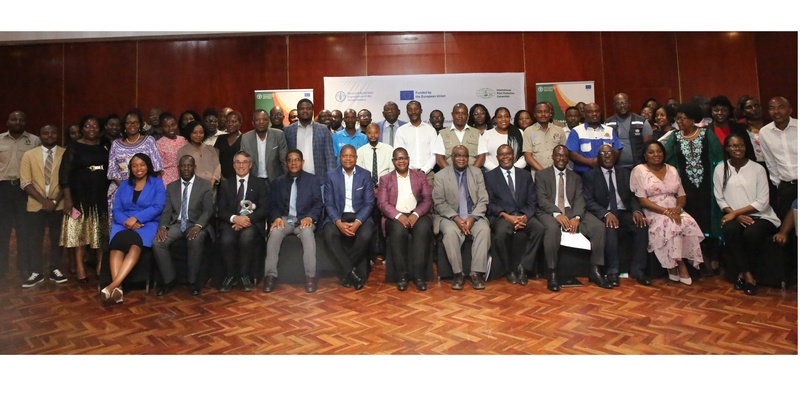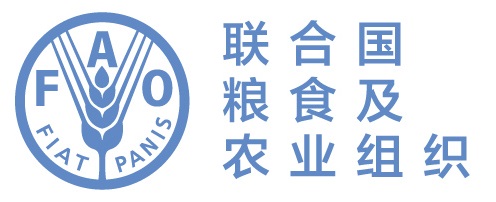Zimbabwe concludes evaluation of national phytosanitary system, starts developing strategy to enhance plant health
Posted on Mon, 19 Feb 2024, 08:50

© FAO/ Donald Chidoori
Harare, 16 February 2024. The Plant Quarantine Services Institute (PQSI) of Zimbabwe and other national stakeholders, including the Ministry of Agriculture, farmer organizations, and representatives of the national customs office, have embarked on the development of a National Phytosanitary Capacity Development Strategy to guide PQSI in its work of improving national phytosanitary systems in the next 5-10 years. The plan for a national plant health strategy and legislation to guide phytosanitary work were some of the key recommendations made at a workshop held from 12 - 16 February 2024 at Rainbow Towers Hotel in Harare, to officially close a project through which PQSI carried out an extensive assessment of Zimbabwe’s phytosanitary system.
The project, entitled “Strengthening of Capacities and Governance in Food and Phytosanitary Control”, was implemented by the International Plant Protection Convention (IPPC) Secretariat, to support national plant protection organizations (NPPOs) within the Common Market for Eastern and Southern Africa (COMESA) to carry out a Phytosanitary Capacity Evaluation (PCE) to improve technical capabilities, governance and strategic planning for food safety and plant health. The project is funded by the European Union. The project has so far assisted nine African countries to conduct PCEs and make progress towards fulfilling their international obligations to protect plant resources from pests. Countries also received support to develop strategic plans to strengthen phytosanitary trade regulatory systems and their national phytosanitary networks.
Zimbabwe concluded its 11-month PCE and validated the results during the February workshop. This was the last of three workshops- the first two workshops held in May and June 2023, during which national stakeholders, including senior government officials, discussed the results. They also discussed key elements of the strategic plan. "The objective of the PCE was to identify and strengthen weaknesses that are in our phytosanitary system," said Nhamo Mudada, PCE National Coordinator at the Zimbabwe Ministry of Lands, Agriculture, Fisheries, Water and Rural Development.
"The main gaps that need to be addressed in the NPPO relate to the structure. For the NPPO to be able to support exports, it needs to strengthen the phytosanitary system. The NPPO needs to have a structure aligned with international laws. The structure is critical for good operations of the NPPO", he added.
A new plan
The new national phytosanitary strategy will address gaps and guide the country’s capacity development needs. PQSI, which is the NPPO of Zimbabwe, will review its organizational structure to ensure adequate and correct staffing. The NPPO also plans to build laboratories and materials and increase training opportunities for its staff. The NPPO can also use the outcomes of the PCE to mobilize resources to implement elements of the phytosanitary strategic plan.
“I commend Zimbabwe on successfully concluding its PCE and taking prompt action to develop a plan to improve its national plant health systems,” said Osama El-Lissy, IPPC Secretary. “Evaluating phytosanitary capacity is essential for countries to be able to adopt and implement the International Standards for Phytosanitary Measures (ISPMs) which provide the foundation for safeguarding agricultural production and natural resource against plants pests and facilitate the safe trade in plants and plant products,” he added.
About the PCE and COMESA project
The PCE is an online-enabled, multiple-step framework that countries use to assess the suitability of their national phytosanitary systems and capacity, including laboratories, quarantine centers, and data storage systems, to meet global phytosanitary requirements. During a PCE, NPPOs lead the entire process, with the support of IPPC-certified phytosanitary capacity evaluation facilitators. This ensures that PCE outcomes and recommendations are unique and relatable to each country and its intentions to improve national-level phytosanitary capacity.
The COMESA project, co-signed by the Government of Zimbabwe, falls within the Sanitary and Phytosanitary (SPS) Policy Framework for Africa, developed by the African Union (AU). The framework aims to spur trade among AU member states and is being implemented in close collaboration with the African Commission Division for Rural Economy and Agriculture.
About IPPC
The IPPC is an international treaty ratified by 185 contracting parties- 184 countries and the European Union, aiming to protect the world's plant resources from the introduction and spread of pests, while promoting safe trade. International Standards for Phytosanitary Measures (ISPMs), developed under the auspices of the IPPC, assist countries in implementing national phytosanitary standards and import requirements. The IPPC, deposited at FAO, is the sole global standard-setting entity for plant health.
About FAO
The Food and Agriculture Organization (FAO) is a specialized agency of the United Nations that leads international efforts to defeat hunger. FAO’s objective is to achieve food security for all and make sure that people have regular access to enough high-quality food to lead active, healthy lives. FAO works to transform agri-food systems by promoting sustainable production and consumption, including protecting the world’s plants, to achieve global food security. FAO works in over 130 countries worldwide and has 195 members - 194 countries and the European Union.
For media enquiries please contact:
Donald Chidoori
Multimedia and Communication Specialist
Food and Agriculture Organization of the United Nations (FAO)
Email: [email protected]
Mutya Frio
Communication Specialist
IPPC Secretariat
Email: [email protected]
Anita Tibasaaga
Writer and Communication Specialist
IPPC Secretariat
Email: [email protected]

